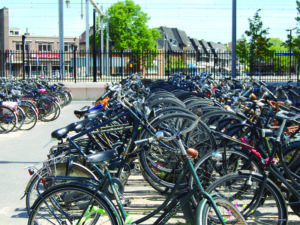Fleet Focus: Netherlands
Zijad Halilovic from Autorola Netherlands explains how government legislation on new cars has caused instability in the country’s used car market.

Zijad Halilovic from Autorola Netherlands
Like many countries, the Netherlands is seeing its motoring landscape change as the hunger to reduce emissions and drivers’ reliance on fossil fuels increases. 2016 was the biggest year for change as the country decided to replicate countries such as Norway, where the introduction of incentives has helped speed up the sale of electric vehicles. The government has set a target for half of new car sales by 2025 to be as electric – or hybrid – powered as part of a green deal.
The scheme is already working as the Netherlands has grown to become the fifth largest market for electric cars globally with a 6-7% penetration of zero emission cars. The Polo is currently the best selling model, although it has suffered a 16% year-on-year fall in sales caused by drivers switching to zero emission models.
Market analysis
The new car market continues to grow in the Netherlands with 258,912 cars registered by the end of July 2017, which was a 15% increase over 2016. Volkswagen is the market leader with 12.4% followed by Opel, Peugeot, Renault and Toyota.
The new car market has undergone a couple of major transformations over the past seven years as the government fine tunes its policies to have a positive outcome on reducing emissions. At the heart of the government green deal has been incentivising company car drivers, which account for around half of the Netherlands’ new car sales each year, to choose a low emission car – petrol, diesel, hybrid and non hybrid – based on reducing their personal tax.
However, the used car market is still trying to play catch up and currently is in disarray with the consumer demand for used cars not matching the supply coming back off leasing fleets and finance from banks. This will take another two to three years before there is equilibrium in our used market.
Currently the company car tax bill on a typical Opel Astra five-door car might be €120-140 a month. On a Nissan LEAF or Chevrolet Ampera that will reduce to between €0-50 a month. This stance on taxation is the main reason demand for EVs in the Netherlands has risen so steeply and is likely to continue as company motorists come to the end of their contracts and replace their petrol or diesel car with something zero emissions.
But zero emission vehicles have had a big advantage since 1 January 2017. All other cars have the same taxation now. Electric vehicles give the company car driver 4% taxation based on the new purchase price. All other cars are taxed on 22% of their new car purchase price.

Netherlands Economics
Toying with taxation
Initially the government reduced tax levels for low emission cars that encouraged more company car drivers to opt for diesels such as the Peugeot 308 and Renault Mégane. And then the government found that the initial idea of reducing the CO2 via this taxation was not actually working in reality. So now the government has changed it into only having a tax advantage on zero emission vehicles.
The initial government focus was also about giving all EVs or plugins a fiscal advantage including high value cars, such as Tesla, which was driven by those who could generally afford the higher level of tax. This has now been changed to restricting fiscal favours to cars costing below €50,000, which is where we are now.
Autorola believes the new car market is now more stable as the government seems to have got its plan right and the growth in zero and low emission EVs is already proving positive, but the used car market remains in turmoil.
As the consumer waits for the zero emission used car supply to increase, small to medium sized petrol used cars are currently what consumers want to buy, but currently the general supply of cars coming into the market are diesel.
This has caused a huge disconnect with the only option for OEMs, leasing groups and dealer groups being the disposal of cars through exporting them to other European countries, including Eastern Europe.

Netherlands Bikes
Remarketing results
Autorola’s online remarketing platform is at the heart of this export strategy with used cars being loaded onto the portal daily, which are being purchased by the thousands of active buyers it has across Europe. Used cars are being exported to Portugal, Germany and Denmark. The used car shortage in Portugal has been well documented with the Mégane and Peugeot 308 popular with buyers.
On the buyer front, OEMs and their dealers are being forced to import used cars into the Netherlands to satisfy current demand. Once again the Autorola platform is coming to the rescue with Dutch buyers using it to bid on and import small to medium sized used petrol cars from across mainland Europe.
Autorola Netherlands has seen major growth over the past 2-3 years based on more used cars being imported and exported through our portal. This so called cross border used vehicle activity is forcing OEMs, leasing companies and dealer groups to think at a European level, no longer at just a country level. For some this is very difficult but only for those who think at a European level will survive.
The new car market is about the local market and the used market is based on a European perspective. This is a very new concept for many and one that we are helping buyers and vendors come to terms with.
In the meantime the growth of new zero emission and hybrid cars continues and Autorola predicts that it will be around 2020 before the used market mirrors the stability of the new market.
Caption: The Volkswagen Polo is currently the best-selling car in Holland, but more and more drivers are switching to EVs

Netherlands VW Polo
Holland economics
Reports from July 2017 suggested the Dutch economy performed well. May data revealed healthy industrial production and strong retail sales while the manufacturing PMI (Purchasing Managers’ Index) increased in June. In fact, Q2 marked the best quarterly PMI performance in over four years. Additionally, private consumption, one of the pillars of growth of the economy, is being supported by declining unemployment as a result of a strong labour market, which should translate into nominal wage increases.
The economic picture is bright and GDP is set to grow robustly this year, on the back of solid private consumption, fuelled by increasing employment and a decline in household debt. Clouds are hovering over the outlook, however, due to political uncertainty at home and abroad. FocusEconomics panelists foresee GDP growing by 2.1% in 2017 and 1.8% in 2018.
The seasonally-adjusted consumer confidence index inched up from June’s 23 points to 25 points in July, despite political gridlock resulting in record-breaking coalition talks, in terms of length. The index remains firmly entrenched above the crucial 0-point mark that separates optimism from pessimism among Dutch consumers. July’s reading came in far above the 20-year average of -3 points.
Confidence among consumers rose on the back of a more upbeat view of the economy but their willingness to buy remains largely unchanged. Consumers’ views were particularly more favourable on the economy in the last 12 months, while sentiment was marginally more upbeat about the economy in the next 12 months. Willingness to buy remained largely unchanged as consumers’ sentiment on their personal financial situation in the next 12 months only inched up slightly, likely due to uncertainty surrounding the political landscape.
However, according to the Central Bureau of Statistics (CBS), Dutch manufacturers’ sentiment, which is measured by the producer confidence indicator, recorded a small dip in July and came in at 6.6 points, below the previous month’s 7.2 points. Despite the slip, the indicator remained firmly above the zero-point mark that separates optimism from pessimism. Manufacturers’ sentiment in the Netherlands has remained in optimistic territory since October 2014, and July’s result was firmly above the long-term average of 0.7 points over the past two decades.
The deterioration in manufacturers’ sentiment reflected less positive views primarily regarding future output and order books in the next three months, while their mood regarding the stock of finished products remained virtually unchanged. Nonetheless, all subcomponents of the indicator remained in positive territory while all subsectors remained positive for the eighth consecutive month—manufacturers of wooden and building material were the most optimistic in July.
Rising house prices are further supporting private consumption by reducing household net debt positions. On the political front, the gridlock continued and the coalition talks were suspended until 9 August due to summer recess. As a result, it was unlikely that a new coalition government would be installed before Prince’s Day on 19 September – the formal opening of the political year and presentation of the government’s budget and polices.

